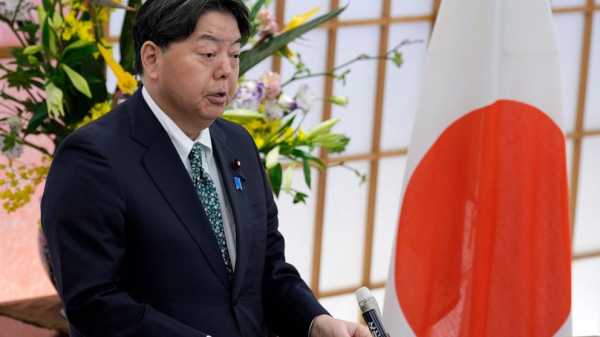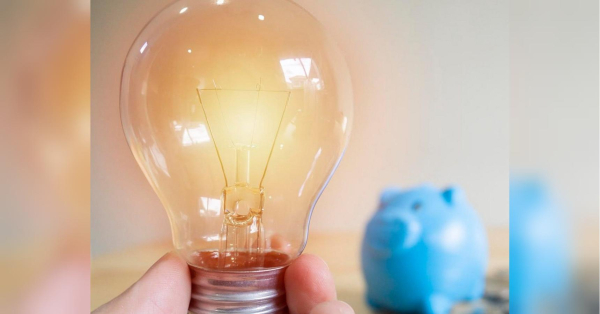
TOKYO — Japanese Foreign Minister Yoshimasa Hayashi said Friday he will visit China this weekend for talks with his counterpart Qin Gang, becoming Japan's first top diplomat to do so in more than three years amid growing frictions between the two countries, including a recent flap over the detention of a Japanese national in Beijing.
Hayashi hopes to “engage in a candid and in-depth exchange of views toward establishing a constructive and stable relationship” at his planned talks with Qin and other officials during his April 1-2 visit, he told a news conference.
He is expected to demand the release of the detained Japanese national, discuss security concerns in the region and ask China to act “responsibly” on global issues including Russia's war on Ukraine.
Hayashi noted an agreement between the leaders of the two countries to build constructive and stable relations but said “Japan-China relations are facing many challenges and concerns, although there are various possibilities (for cooperation).”
Despite close economic and business ties between the two Asian powers, Tokyo and Beijing have been increasingly at odds in recent years as Japan considers China’s growing influence in the region as a threat to its national security and the economy.
“I believe it is important to build a constructive and stable relationship while we insist on our position on some issues, seek (China's) responsible actions and continue our dialogue,” Hayashi added.
His predecessor Toshimitsu Motegi's December 2019 visit to China was the last such trip made by a top Japanese diplomat, just prior to China's near-total closure of its borders amid strict pandemic control measures.
Commenting on Hayashi’s visit, Chinese Foreign Ministry spokesperson Mao Ning said it was in the “common interests of the two sides and the region to maintain the sound and stable development of China-Japan relations.”
Mao said Qin and other Chinese leaders she didn’t name would “have an in-depth exchange on bilateral relations and regional and international issues of mutual concern.”
However, in a reminder of the underlying tensions, Mao also criticized new Japanese restrictions on the export of semiconductors to China.
“Politicizing … and weaponizing sci-tech and trade issues and intentionally undermining the stability of global supply and industrial chains would only hurt others as well as oneself,” she said.
Japan is among the U.S. allies that have followed Washington in restricting Beijing’s access to the sensitive technology.
The latest friction between the two sides is over China's detention of an employee of the Japanese pharmaceutical company Astellas Pharma earlier this month on suspicion of spying. Japan's government has demanded his release and an explanation.
China's Foreign Ministry said the Japanese citizen was suspected of “engaging in espionage activities in violation of the criminal law … and the Anti-Espionage Law of the People’s Republic of China."
Mao offered no new information about the detainee but said the person's legal rights would be protected and that the detainee would have access to Japanese consular officials.
More than a dozen Japanese citizens with business or other connections to China have been arrested in the past over allegations including spying.
A long-festering dispute over uninhabited East China Sea islands controlled by Japan but claimed by China also flared again in mid-March, with both sides accusing the other of infringing on their maritime territory.
The islands are known as the Senkakus in Japanese and Diaoyu in Chinese. Taiwan also claims the islands but has forged agreements with Japan to avoid such conflicts.
China routinely sends coast guard vessels and planes into waters and airspace surrounding the islands to harass Japanese vessels in the area and force Japan to scramble jets in response.
Tokyo considers China a threat to its national and regional security and has been expanding its security cooperation with other “like-minded” countries in the region and Europe, as well as NATO, while promoting a vision of a “free and open Indo-Pacific" as a counter to China.
Hayashi said Friday he will travel to Brussels after his China visit to attend a NATO foreign ministers’ meeting to reaffirm Japan's commitment to the rules-based international order and reinforce cooperation between Japan and NATO in their response to Russia's invasion of Ukraine and other key issues.
Japan is also concerned about growing joint military exercises between China and Russia around Japanese coasts.
Also Friday, China's Defense Ministry said it was setting up a direct telephone connection with its Japanese counterpart that would “strengthen the capabilities of the two sides to manage and control maritime and air crises.”
The Chinese ministry has a similar hotline with the Pentagon, although Beijing has been reluctant to make effective use of it.
Amid tensions over the U.S. shooting down a suspected Chinese spy balloon in February, China refused to accept a phone call from U.S. Defense Secretary Lloyd Austin to discuss the matter, threatening unspecified retaliation instead.
___
AP videojournalist Haruka Nuga contributed to this report.
Sourse: abcnews.go.com






